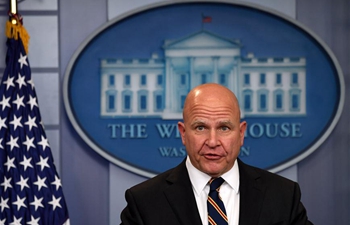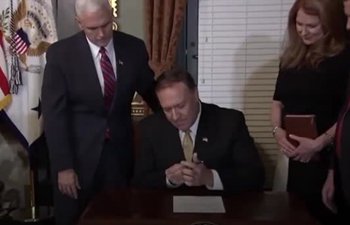WASHINGTON, March 25 (Xinhua) -- Squeezed between the bold headlines of proposed 60-billion-U.S. dollar tariffs on China and a hawkish John Bolton taking over the National Security Council, the news that Congress has just passed a 1.3-trillion-dollar budget can be easily overlooked.
Under any other presidency, the bill, which cleared Congress early Friday, would have been dissected, analyzed and debated over for every bit of its detail, but in Trump's era, the omnibus spending plan would have to settle for the backseat.
The battle over spending budgets have long been the primary source of drama on Capitol hill, locking the two main political parties in tooth and nail fights that more often than not leaves both parties feeling cheated out and eager to regain lost ground in the next round.
Partially driven by this sentiment, and also by pure partisanship, annual budget bill debates have been made into multi-episode TV series to be played out through the year. Spending bills for months, or even weeks, are passed, so that lawmakers would repeat the drama multiple times in a fiscal year.
U.S. media have made an analogy between this behavior pattern and a schoolboy kicking a can down the road, mocking Congress for its preference of delaying solving a problem over actually solving it.
After rounds of short "stop-gap" spending bills in recent months, Congress once again found themselves before a deadline this week to keep the U.S. federal government funded. This time, Congressional leaders had a bill up their sleeves, but only revealed it less than 48 hours before the current bill expired, giving lawmakers less than two days to make up their minds.
Going through the bill, which is more than 2,200 pages that stack up half a meter, is admittedly a feat, but not impossible for the seasoned veterans on the hill. Still, the number of lawmakers who actually went from page to page may be only down to one, Republican Senator Rand Paul from the state of Kentucky.
At about 11 o'clock Thursday, Paul tweeted a picture of himself holding the bill, which he said took over two hours to print, with the caption: " Well here it is, all 2,232 budget-busting pages. The House already started votes on it. The Senate is expected to soon. No one has read it. Congress is broken..."
Paul then started live tweeting as he crunched through the pages, sharing "interesting" findings and trashing provisions he disliked.
At about 4:20 pm (2020 GMT), Paul tweeted: "Page 278. (1954 to go!) 961 million U.S. dollars to destroy our chemical weapons. Who was it, exactly, who convinced our government to pay billions to develop weapons we now find deplorable?"
Then around 6 pm (2300 GMT), "Page 376 of terrible, rotten, no-good budget busting bill: I found it! I found it! Border security, what President Trump wanted! No . . .wait a minute section says Defense can spend what funds it determines to enhance the border security of Jordan, Lebanon, Egypt, and Tunisia."
While going over a bill that needed a vote made perfect sense to political outsiders, Paul's persistence was met with frowns and scowls from his peers, who see him deliberately delaying the voting process, as all 100 members' consent is needed for the upper chamber of Congress to proceed onto a vote.
Finally, after 600 pages and a prolonged phone call from Senate Majority leader and fellow Kentucky Senator Mitch McConnell, Paul relented, saying he will vote "if they insist on voting."
But Paul was not the only one who gave a good spook. Republican Senator Jim Risch from the state of Idaho also took issue with the bill, but for a far simpler reason: a provision buried in Page 786 would have a park in his state named after one of his political foes who have recently died.
Luckily the rebellion was also quickly quelled by McConnell, and the Senate passed the bill in the early hours of Friday, leaving the president with almost a full 24 hours to sign off on the bill.
White House Management and Budget Office Director Mick Mulvaney has explicitly said Trump will sign whatever bill the Congress has passed, so it would be a breeze, right? Guess again.
"I am considering a VETO of the Omnibus Spending Bill," Trump tweeted Friday morning, sending tremors to the hill. But a tip from a White House official that came on the heel of the tweet offered assurances: "I think he(Trump) just want to add a little drama."
Finally at 1 pm (1800 GMT), Trump appeared at the White House, with a pen in hand. "We are very disappointed," he said, but "in order to fund the military, we had to give up things where we consider, in many cases, them to be bad or them to be a waste of money."
"I will never sign another bill like this again," Trump vowed.
Despite the futile complaint, Trump nevertheless made a point when he chided lawmakers for their collective indifference. "Nobody read it. It's only hours old. Some people don't even know what is in it," he said.













